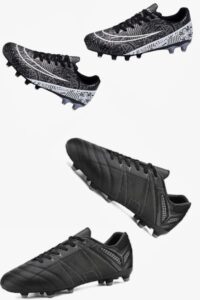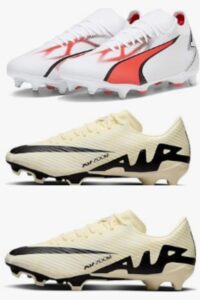In this topic, I’m going to talk about football shoes and specifically delve into the concept of Artificial Ground (AG). In my own personal experience, understanding the right type of football shoe for different playing surfaces has been crucial for performance and injury prevention.
Table of Contents
ToggleWhat is AG in Football Shoes?
Artificial Ground, often abbreviated as AG, refers to a specific type of soleplate designed for football shoes. It is engineered to optimize traction and performance on modern artificial grass pitches, which have become increasingly common in both amateur and professional football leagues. These pitches, made from synthetic fibers and often filled with rubber granules or sand, differ significantly from traditional natural grass surfaces in terms of their texture and play characteristics. Check out the latest models of AG: Artificial Ground football shoes here.

The Importance of AG Soleplates
AG soleplates are distinguished by their design features, which cater to the unique demands of artificial turf. Unlike firm ground (FG) or soft ground (SG) shoes, AG shoes typically feature shorter, more numerous studs or rubber blades. This design helps distribute pressure evenly across the foot, reducing the risk of injury and providing reliable grip without excessive penetration into the turf. AG shoes are also crafted to be more durable, as the abrasive nature of artificial grass can wear down traditional studs more quickly.
When to Use AG Football Shoes
If you frequently play on artificial grass pitches, investing in a pair of AG football shoes is highly recommended. These shoes are specifically engineered to enhance your performance on synthetic turf while offering the necessary stability and maneuverability. Whether you’re playing a competitive match or training on artificial surfaces, AG shoes can provide the confidence and comfort needed to perform at your best. Check out the latest models of AG: Artificial Ground football shoes here.
tips for Choosing the Right AG Football Shoes
When selecting AG football shoes, consider factors such as fit, comfort, and the specific design of the soleplate. Look for shoes that offer adequate support for your playing style and foot shape. It’s also essential to ensure that the studs or blades are compatible with the type of artificial turf you’ll be playing on most frequently.
Examples of AG Football Shoes
Several reputable brands offer AG football shoes tailored to meet the demands of artificial grass surfaces. Here are a few examples:
1. Nike Mercurial AG
The Nike Mercurial line is renowned for its lightweight construction and responsiveness. The AG version of the Mercurial features a stud configuration optimized for quick acceleration and sharp turns on artificial turf. The shoes are designed to provide excellent traction without compromising agility, making them a favorite among attacking players. Check out the latest models of AG: Artificial Ground football shoes here.
2. Adidas Predator AG
Adidas Predator AG shoes combine power and precision with enhanced grip on artificial grass. The soleplate features a mix of conical and bladed studs strategically placed to improve stability and maneuverability. These shoes are popular among midfielders and playmakers who require control and accuracy in their movements.
3. Puma Future AG
Puma Future AG shoes prioritize comfort and adaptability on synthetic surfaces. The AG soleplate is designed to offer reliable traction and support during sudden changes in direction. With a focus on agility and fit, Puma Future AG shoes are favored by players who rely on speed and agility to outmaneuver opponents. Check out the latest models of AG: Artificial Ground football shoes here.

Drilling Deeper: Comparing AG Football Shoes
When comparing AG football shoes, several factors come into play that can influence your decision. Let’s drill deeper into these considerations:
1. Stud Configuration
AG football shoes vary in their stud configurations, which affect traction and stability on artificial turf. Nike Mercurial AG shoes, for example, often feature a minimalist design with multiple small studs or blades, ideal for quick movements and acceleration. In contrast, Adidas Predator AG shoes may incorporate a mix of conical and bladed studs to provide a balance of grip and maneuverability.
2. Material and Durability
The materials used in AG football shoes can impact their durability and performance. Nike, Adidas, and Puma utilize advanced synthetic materials that are lightweight yet robust, designed to withstand the abrasiveness of artificial grass. Pay attention to features like reinforced toe caps and water-resistant treatments, which enhance longevity and comfort during play. Check out the latest models of AG: Artificial Ground football shoes here.
3. Fit and Comfort
Comfort is paramount when choosing AG football shoes, as they need to provide adequate support and cushioning on unforgiving artificial surfaces. Nike Mercurial AG shoes are celebrated for their snug fit and responsive feel, catering to players who prioritize agility and touch. Adidas Predator AG shoes offer a more structured fit, accommodating a wider range of foot shapes while ensuring stability and control.
4. Performance Enhancements
Each brand incorporates unique technologies aimed at enhancing performance on AG pitches. For instance, Puma Future AG shoes may feature innovative lacing systems and adaptive designs that mold to the foot for a customized fit. These enhancements not only improve comfort but also optimize energy transfer and responsiveness during gameplay. Check out the latest models of AG: Artificial Ground football shoes here.
comparison tabular
Here’s a comparison table summarizing key considerations when choosing AG football shoes from Nike, Adidas, and Puma:
| Aspect | Nike Mercurial AG | Adidas Predator AG | Puma Future AG |
|---|---|---|---|
| Stud Configuration | Multiple small studs or blades for quick acceleration. | Mix of conical and bladed studs for grip and maneuverability. | Strategic stud placement for agility and sudden movements. |
| Material | Lightweight synthetic materials for speed and agility. | Durable materials with enhanced durability and control. | Adaptive designs for comfort and responsiveness. |
| Fit and Comfort | Snug fit with responsive touch for agility. | Structured fit accommodating various foot shapes. | Customized fit with adaptive features for comfort. |
| Performance Tech | Focus on speed and agility with responsive feel. | Precision and control with enhanced grip. | Energy transfer and responsiveness for dynamic play. |
| Durability | Designed for durability on abrasive artificial surfaces. | Reinforced toe caps and water-resistant treatments. | Longevity with robust materials and construction. |
Key Considerations:
- Playing Style: Nike Mercurial AG suits players who rely on speed and agility, Adidas Predator AG is ideal for those needing precision and control, while Puma Future AG focuses on comfort and adaptability.
- Fit and Comfort: Consider the fit that best suits your foot shape and playing preferences, ensuring comfort and performance throughout the game.
- Durability and Materials: Look for shoes made from durable materials that can withstand the demands of artificial grass pitches, enhancing longevity and performance.
- Stud Configuration: The stud configuration impacts traction and maneuverability; choose based on your playing position and style.
- Performance Enhancements: Evaluate additional technologies or features that enhance performance, such as responsive touch or energy transfer systems. Check out the latest models of AG: Artificial Ground football shoes here.
FAQs on AG Football Shoes
Q1: Why should I choose AG football shoes over FG or SG shoes?
AG football shoes are specifically designed to optimize performance on artificial grass pitches. They feature shorter, more numerous studs or blades that provide enhanced traction and stability on synthetic surfaces, reducing the risk of injury and improving overall comfort and control.
Q2: How do I know if AG shoes are suitable for the type of artificial turf I play on?
AG shoes are generally suitable for most types of artificial turf, including those with rubber infills or sand bases. However, it’s essential to consider the specific conditions of the pitch you play on. If in doubt, consult with coaches or check manufacturer recommendations to ensure compatibility.
Q3: Can I use AG football shoes on natural grass pitches?
While AG shoes are designed for artificial grass, they can be used on natural grass surfaces to some extent. However, the stud configuration and durability may not be optimized for natural grass, potentially affecting traction and longevity compared to FG (firm ground) shoes designed specifically for natural grass.
Q4: How do I care for AG football shoes to prolong their lifespan?
To extend the lifespan of AG football shoes, regularly clean them after use to remove dirt and debris. Avoid leaving them exposed to extreme heat or sunlight, as this can degrade the materials. Additionally, store them in a cool, dry place when not in use and consider rotating between multiple pairs to minimize wear. Check out the latest models of AG: Artificial Ground football shoes here.
Final Words
Choosing the right AG football shoes is crucial for maximizing your performance and enjoyment on artificial grass pitches. Whether you prioritize speed, control, or comfort, brands like Nike, Adidas, and Puma offer a range of options tailored to meet your specific needs. By considering factors such as stud configuration, material quality, fit, and performance enhancements, you can make an informed decision that enhances your comfort, confidence, and overall performance on the field.

Meet Mike, the visionary behind Forumdogo.com a platform born out of his lifelong passion for shoes. From his early years, Mike has been enamored with footwear, exploring diverse brands like Hoka, Timberland, Asics, Adidas, Puma, Louis Vuitton, Nike, Birkenstocks, Hey Dudes, Crocs, Vans, Uggs, Converse, New Balance, and many more. With a fervent dedication to footwear research, Mike passionately shares his insights and knowledge through Forumdogo.com, providing a comprehensive resource for shoe enthusiasts everywhere.
Related Posts
- FG-HG: Firm Ground Hard Ground in football shoes a Guide
When it comes to choosing the right football shoes, understanding the different types can make…
- TF: Turf Significance in football shoes Clarified
In my own personal experience, football shoes are not just footwear; they're your tools on…
- CTR360: Control 360 significance in football shoes Clarified
In this topic, I'm going to talk about football shoes, specifically focusing on the CTR360…
- IC: Indoor Court significance in football shoes Clarified
Today, I'm diving into the world of football shoes. Whether you're a die-hard fan or…
- X-FG: X Series Firm Ground significance in football shoes Clarified
In this topic, I'm going to talk about football shoes, specifically the X-FG - X…
- T7: Tiempo 7 Significance in football shoes Clarified
In this topic, I'm going to talk about football shoes, specifically focusing on the T7…
- RP: Repetto in football shoes Explained
In this topic, I'm going to talk about shoes and share my own personal experience…
- RNG: Range Significance in football shoes Clarified
In this topic, I’m going to talk about the range of football shoes and how…
- TF-HG: Turf Hard Ground in football shoes a guide
When it comes to football, choosing the right pair of shoes can make all the…
- SL-FG: Super Light Firm Ground in football shoes Explained
When it comes to football shoes, choosing the right pair can make a huge difference…
- FR: Future Release significance in football shoes Clarified
When diving into the world of football shoes, there's a lot to unpack. In this…
- PK: PureKnit Significance in football shoes Clarified
Football shoes can make or break your game. Choosing the right pair isn't just about…
- CV: Curve in football shoes Explained
In this topic, I'm going to talk about football shoes and share insights from my…
- PM: Primeknit significance in football shoes Clarified
In this topic, I’m going to talk about PM - Primeknit, a revolutionary technology in…
- DX: Deluxe in football shoes Explained
Shoes aren't just about covering your feet; they are a statement, a reflection of your…